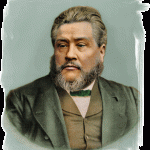 “He who grows in grace remembers that he is but dust, and he therefore does not expect his fellow Christians to be anything more. He overlooks ten thousand of their faults, because he knows his God overlooks twenty thousand in his own case. He does not expect perfection in the creature, and, therefore, he is not disappointed when he does not find it. When our virtues become more mature, we shall not be more tolerant of evil; but we shall be more tolerant of infirmity, more hopeful for the people of God, and certainly less arrogant in our criticisms.” – C.H. Spurgeon
“He who grows in grace remembers that he is but dust, and he therefore does not expect his fellow Christians to be anything more. He overlooks ten thousand of their faults, because he knows his God overlooks twenty thousand in his own case. He does not expect perfection in the creature, and, therefore, he is not disappointed when he does not find it. When our virtues become more mature, we shall not be more tolerant of evil; but we shall be more tolerant of infirmity, more hopeful for the people of God, and certainly less arrogant in our criticisms.” – C.H. Spurgeon
Category Archives: Sanctification
Don’t Assume
It may be the best known Bible verse in our culture: “Judge not, that you be not judged” (Matt. 7:1).
As one of our society’s most popular verses, it is also one of the most misunderstood. Too many people, non-Christian and Christian, take Jesus’ words to be a blanket rejection of all moral evaluation. But given that Jesus alludes to his opponents as dogs and pigs five verses later, it’s safe to think Jesus wasn’t condemning every kind of judgment. We see from the rest of the Gospel that Matthew 7:1 is not inconsistent with strong criticisms, negative statements, church discipline, and warnings about hell. Judgmentalism is not the same as making ethical and doctrinal demands or believing others to be wrong.
And yet, after all the necessary qualifications, we must not mute this important command. As sinners, we are apt to assume the worst about people. We are eager to find favorable comparisons that make ourselves look good at the expense of others. We are quick to size people up and think we have them figured them out. But I have learned over the years–both as the giver and receiver of judgmental assumptions–that it’s best not to assume.
Don’t assume you know all the facts after hearing one side of the story.
Don’t assume the person is guilty just because strong charges are made against him.
Don’t assume you understand a blogger’s heart after reading one post.
Don’t assume that famous author, preacher, athlete, politician, or local celebrity won’t read what you write and don’t assume they won’t care what you say.
Don’t assume the divorced person is to blame for the divorce.
Don’t assume the single mom isn’t following Jesus.
Don’t assume the guy from the Mission is less of a man or less of a Christian.
Don’t assume the pastor looking for work is a bad pastor.
Don’t assume the church that struggles or fails is a bad church.
Don’t assume you’d be a better mom.
Don’t assume bad kids are the result of bad parents.
Don’t assume your parents are clueless.
Don’t assume everyone should drop everything to attend to your needs, and don’t assume no one will.
Don’t assume the rich are ungenerous.
Don’t assume the poor are lazy.
Don’t assume you know what they are all like after meeting one or two of their kind.
Don’t assume you should read between the lines.
Don’t assume you have interpreted the emotions of the email correctly.
Don’t assume everyone has forgotten about you.
Don’t assume they meant to leave you off the list.
Don’t assume everyone else has a charmed life.
Don’t assume a bad day makes her a bad friend.
Don’t assume the repentance isn’t genuine.
Don’t assume the forgiveness isn’t sincere.
Don’t assume God can’t change you.
Don’t assume God can’t love you.
Don’t assume God can’t love them.
The Most Helpful Thing
 I wonder if you can relate to any of this. One of the first things God the Holy Spirit did for me after I had come to faith in Christ was to give me a deep settled assurance of salvation. Romans 8:16 tells us that “The Spirit himself bears witness with our spirit that we are children of God…” This inner witness brought me the sure knowledge that despite my many flaws and failures, the wonders of this great salvation become clear – God had saved me, I was His, and Christ did indeed love me and had given me eternal life. Heaven sent joy and peace flooded my soul. I knew I could say, “I am my Beloved’s and He is mine.”
I wonder if you can relate to any of this. One of the first things God the Holy Spirit did for me after I had come to faith in Christ was to give me a deep settled assurance of salvation. Romans 8:16 tells us that “The Spirit himself bears witness with our spirit that we are children of God…” This inner witness brought me the sure knowledge that despite my many flaws and failures, the wonders of this great salvation become clear – God had saved me, I was His, and Christ did indeed love me and had given me eternal life. Heaven sent joy and peace flooded my soul. I knew I could say, “I am my Beloved’s and He is mine.”
But then, somewhere along the way this settled peace was disturbed. The wonders of His grace, wrought through Christ and His atoning work became obscured… not because I read some book countering Christianity and was swayed by the arguments, but because I came across Scriptures that at least at first glance, seemed to show that my salvation was a lot more flimsy and shaky than I first imagined. Perhaps you can identify with this.
Here’s what I mean: I read Scriptures such as “nothing can separate us from the love of God” (Rom 8: 39) but then read “the one who endures to the end will be saved.” (Matt 24:13)
I read, “…whoever believes in Him will not perish but have eternal life” (John 3:16) and then read “Now I would remind you, brothers, of the gospel I preached to you, which you received, in which you stand, and by which you are being saved, if you hold fast to the word I preached to you—unless you believed in vain.” (1 Cor 15:1,2)
I thought, “which is it God? If someone believes, You say that they have eternal life, but here it says that someone can “believe in vain.” How could both statements be true?”
I read about how God started the work in us and would in fact complete it (Phil 1:6) and that “these whom He justified, He glorified” (Rom 8:30) showing me that none of His truly justified saints fall through the cracks, but all end up saved. I cannot for a moment imagine Jesus failing to fulfill the will of His Father, and in John 6:39 He makes clear what the Father’s will actually is: “And this is the will of him who sent me, that I should lose nothing of all that he has given me, but raise it up on the last day.”
These Scriptures, and many others like them gave me great assurance that I was saved by grace alone through faith in Christ alone, but then I read other Scripture verses that would say things such as, “without holiness no one will see the Lord.” (Heb 12:14)
Continue reading

